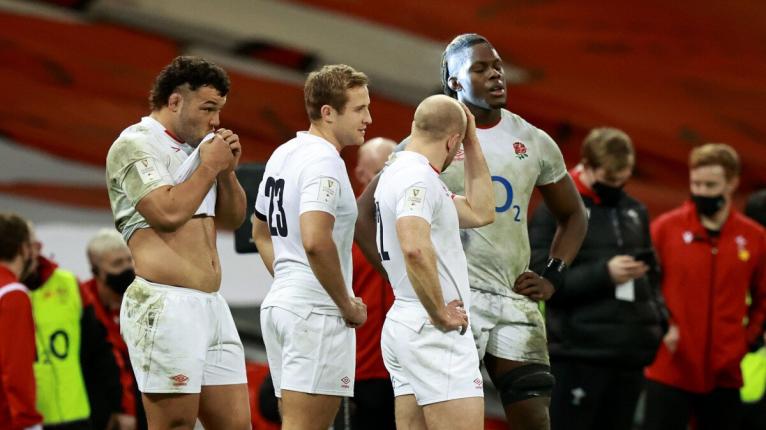Saturday’s Guinness Six Nations win for Wales was not lacking in talking points, but one of the main takeaways from the match was England’s discipline.
Eddie Jones’ side conceded 14 penalties, five more than their opponents, which is the third time in as many games this year that their penalty count has been in double figures (12 against Italy and 15 against Scotland). If ten penalties is the standard that teams seek to stay under, it is no surprise that England have lost two matches so far this Championship. But this is a growing trend for the side.
Jones’ tenure can be roughly split into three stages: the success of 2016-2017, his annus horribilis in 2018, and the resurgence in 2019 which saw England reach a World Cup final and win the Six Nations and Autumn Nations Cup in 2020.
When looking at England’s post-2018 form, there is a correlation between performances and penalty count. After a wayward year in 2018 where the team conceded an average of 10.4 penalties per match, that number was slashed the next year to 7.2 per match. Though 2020 brought success, England perhaps were not firing on all cylinders in the same way they were the year before, and that is reflected by their penalty count of nine per match. But that was still in single figures.
If anyone was starting to think that this year had shades of England’s stuttering 2018, the penalty count suggests it does. In fact at 13.6 penalties per match, the team are actually conceding over three penalties per match more than they did three years ago.
Of the six games England have lost since the beginning of 2019, they have conceded more penalties that their opponent on five of those occasions. The only game they lost in which their discipline was superior was against France in last year’s Six Nations, where their penalty count was five to France’s seven, which is fairly close.
So it’s a rather simple equation for England, concede fewer penalties and they are likely to win.
However, it does not necessarily mean they are likely to lose if they concede more penalties than their opponents, as they have won 37 per cent of their matches since 2019 by being the most ill-disciplined side. This is partly because the intensity they bring in defence can lead to penalties. Their 2019 Six Nations win over Ireland is proof of this. In one of England’s best performances of the Jones era, they doubled Ireland’s penalty count eight to four, but were still comfortable winners.
While it seems fairly obvious that the most well-behaved side is more likely to win, it is by no means a given that penalty counts predict outcomes for all teams. When looking at the weekend’s encounter, Wales have lost four of their last seven matches against England but have conceded 55 penalties to the opposition’s 70, with 17 of the 55 coming in one match alone. Moreover, in only one of those seven matches has their penalty count been worse than England’s.
Refereeing decisions aside, England have discipline problems. Their average penalty count in games has gone up by 6 in the last two years… pic.twitter.com/fAatgGTC51
— Sean Holley 🎤📺🏉📝🎥🏌🏻♂️ (@_SeanHolley) March 1, 2021
Ireland, in contrast to England, have had poorer discipline than their opponents in only one of their ten losses since 2019 (against Japan).
The World Champions South Africa have only been more ill-disciplined than their opponents in four of their nine losses or draws since 2018 (dating back further as they have not played since 2019), while the All Blacks have been twice in their five losses or draws since 2019.
England’s ability to stay on the right side of the law therefore seems far more significant than it does to their opponents.

The oppressive defence under John Mitchell and playing close to ‘the edge’ may be a factor in this, as England have a ‘win a penalty or give a penalty’ approach. Consequently, penalties are more frequent and decisive in their matches. Therefore, depending on which side of the law they fall, they can either swarm their opponents or find themselves constantly being penalised and struggling to get a foothold in the game.
Maro Itoje embodies this mindset more than most. The lock gave away five penalties at the Principality Stadium, but another referee could have interpreted possibly three of them differently.
The 26-year-old was picked up for a deliberate knock-on, playing the ball on the floor and an offside, but all three were marginal. Had he not been punished, he would have suddenly put Wales under huge pressure and put England on the front foot.
Wayne Pivac on Maro Itoje and the amount of penalties he gave away in #WALvENG 👀 pic.twitter.com/Uf0Cn9aBGG
— RugbyPass (@RugbyPass) February 28, 2021
Jones cannot be faulted for firing his players up from the word go, but that has come at a price this Six Nations, and that price seems to be having a penalty count equal to the tackle count in the opening five minutes.
Ultimately, when the pressure is increased, a side’s fragility will be illuminated all the more. By the time the score was 24-24, the manner in which either side had accrued those points was irrelevant. What was important was the next 20 minutes and who could hold their nerve, and it is never wise to back a side with such a shaky disciplinary record in that situation.
When looking at Wales’ skipper Alun Wyn Jones, who is the personification of the phrase ‘heart in the oven, head in the fridge’, it was never in doubt. England’s discipline was so poor in the final stages that the ending was nothing short of a canter for Wayne Pivac’s side.

There are plenty of theories being posited as to why England are having a tough time with referees currently. One is the lack of playing time that their Saracens contingent have had, while another is the difference in officiating between the Gallagher Premiership and Test matches.
Either way, the penalty count is often a bellwether of England’s performance as a whole, and their discipline is currently on a downward spiral.
England Penalty Count
2021
14 versus Wales (9)- Lost
12 versus Italy (11)- Won
15 versus Scotland (6)- Lost
Average: 13.6 penalties per match
2020
9 versus France (16)- Won
7 versus Wales (17)- Won
13 versus Ireland (12)- Won
5 versus Georgia (12)- Won
13 versus Italy (13)- Won
10 versus Wales (6)- Won
13 versus Ireland (7)- Won
6 versus Scotland (8)- Won
5 versus France (7)- Lost
Average: 9 penalties per match
2019
10 versus South Africa (8)- Lost
6 versus New Zealand (11)- Won
8 versus Australia (5)- Won
8 versus Argentina (8)- Won
4 versus USA (11)- Won
10 versus Tonga (9)- Won
7 versus Italy (11)- Won
6 versus Ireland (5)- Won
12 versus Wales (11)- Lost
8 versus Wales (7)- Won
5 versus Scotland (6)- Draw
3 versus Italy (7)- Won
9 versus Wales (3)- Lost
4 versus France (6)- Won
8 versus Ireland (4)- Won
Average: 7.2 per match
2018
6 versus Australia (10)- Won
12 versus Japan (9)- Won
7 versus New Zealand (4)- Lost
11 versus South Africa (5)- Won
6 versus South Africa (14)- Won
13 versus South Africa (9)- Lost
12 versus South Africa (5)- Lost
11 versus Ireland (12)- Lost
15 versus France (11)- Lost
13 versus Scotland (7)- Lost
10 versus Wales (2)- Won
9 versus Italy (12)- Won
Average: 10.4 penalties per match


























